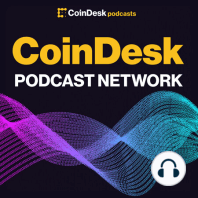10 min listen
LEIGH: What Artists Love About Crypto
ratings:
Length:
16 minutes
Released:
Jul 5, 2020
Format:
Podcast episode
Description
In this audio interview, CoinDesk’s Leigh Cuen and Blockade Games co-founder Marguerite deCourcelle talk about bitcoin’s impact on artistic careers. From collecting unique, interactive pieces to designing video games, Cuen and deCourcelle explore how crypto could redefine modern art.Bitcoin is money but blockchain technology can also be used in a wide variety of art projects. Perhaps the best known variety of blockchain-based visual art is non-fungible tokens (NFTs). For example, Blockade Games co-founder Marguerite deCourcelle said her startup sold $160,000 worth of crypto assets, like NFTs, with most of the profits from two editions of their first game Neon District. “Blockade has minted over 850,000 assets to blockchain game players,” eCourcelle said.She initially broke onto the scene with paintings that included clues to hidden bitcoin prizes, then started creating interactive, digital art coupled with written roleplaying folklore as well. “Instead of the idea of running through the digital treasure hunt and possibly getting bitcoin at the end, the design is now that you start at the beginning, there’s no barriers to you can just start playing,” she said, describing her video games. “Earning tokens in the background and you’re notified once you’ve created something that’s unique.” In short, the artist can now co-create with the audience in a way that scales individual experiences. Although DeCourcelle still paints, she’s become fascinated with the creative and artistic potential of blockchain technology.Since the first wave of so-called decentralized applications (dapps) in 2017, non-fungible tokens (NFTS) have earned gamers more than $20 million through trading and startups roughly $13.6 million for selling the digital assets, according to blockchain analytics firm Flipside Crypto. Most of that traction was in 2017, when the collectibles game CryptoKitties was the season’s hottest trend and briefly surged to more than 14,000 users. Yet Flipside Crypto CEO David Balter said observers should not dismiss blockchains like Celo and the CryptoKitties creators’ upcoming Flow. Other gaming dapps like Gods Unchained and My Crypto Heroes garnered $4.2 million and $1.5 million, respectively, selling digital assets. “There are a number of chains that are working to establish dapps that are participants on the chain. Celo, for example, is doing a good job,” Balter said, listing the above-mentioned gaming projects as well. “We’re talking about customer acquisition costs and lifetime value...these are real businesses.”Flipside Crypto data scientist Angela Minster added most of these games so far see a surge during the first year then struggle to retain users. In 2020, she expects to see improvement in that department. In addition to niche gaming fans, investors’ interest in NFTs hasn’t wavered yet. The “Bitcoin Billionaire '' twins, Tyler and Cameron Winklevoss of the Gemini crypto, are also bullish on NFTs. They acquired the NFT marketplace Nifty Gateway in 2019, which opened for business in March 2020 with digital pieces from artists like doodle-master Jon Burgerman and painter Kenny Scharf. A Nifty Gateway spokesperson said the platform has partnered with 16 brands and artists so far, with one Nifty selling for $1,500.“Kenny Scharf sold out his collection around two and a half minutes,” the spokeswoman added. Very earlyBarely anybody uses crypto games these days and even Ethereum fans love to diss them, but some aficionados say a few startups show potential. It’s a long shot, to be sure. Critics may argue these efforts are merely a small group of people trading software trinkets between friends. If so, that is also still true of the broader industry. Balter estimated that by May 2020 roughly 2.13% of bitcoin wallets held 95% of bitcoin in circulation. This is still an industry with thousands of people holding most of the assets, betting broader demand from millions will drive value. “This is actually the lowest concentration of [b
Released:
Jul 5, 2020
Format:
Podcast episode
Titles in the series (100)
CryptoTitties by CoinDesk Podcast Network
